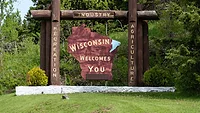The Grass Is Gone
Many cities and towns are now encouraging people to lose the Kentucky bluegrass, offering cash rebates to people who replace their lawns with rock gardens, perennial beds, a tangle of ivy, cactuses or other kinds of less water-hogging plantings. Researchers at the National Gardening Association say as many as 10 percent of all yards may be dominated by something other than grass.
People are returning long-banished native plants to their yards - not only cactuses and yuccas in the arid West, but also buffalo grass on the high plains and live oak and buttonwood in Florida, where a drought is in its fourth year.
Much of the turf grass grown in this country is not native and requires a lot of water, chemical herbicide and fertilizer to keep up its appearance. The average lawn will use up to 10,000 gallons of water over a summer. And the National Wildlife Federation says the average suburban lawn takes in 10 times more pesticides than an acre of farmland.
In Glendale, Ariz., homeowners can receive a $100 rebate for converting 50 percent or more of their grass to lower-water-use shrubs or plants. Southern California's Metropolitan Water District, which serves 17 million households and uses up to half its water on home irrigation, is studying similar cash-for-grass programs.
In Denver, the term "xeriscape" was coined to promote a seven-step program to get people to use plants that conserve water. The word, based on the Greek word for "dry," has now been evoked in numerous ordinances around the country. City officials say about 25 percent of all homeowners served by the Denver water department have converted some or all of their lawns into yards more adaptive to the arid, high-elevation climate near the Rocky Mountain Front Range.
Federal officials are looking to see how replacing grass with other species can save on water. Preliminary results showed that a city could save 40 percent of its water by taking the new landscaping approach.
In some communities, the desire to save water runs into strict covenants that require homeowners to keep green, perfectly mowed grass of a certain species. Sara Romeo has introduced a bill in the Florida State Legislature to allow people in deed-restricted communities to grow something other than water-guzzling St. Augustine grass. "It's crazy," Romeo says. "We live in a state with a terrible drought, and half the water is going to landscaping.
Looking for a reprint of this article?
From high-res PDFs to custom plaques, order your copy today!






